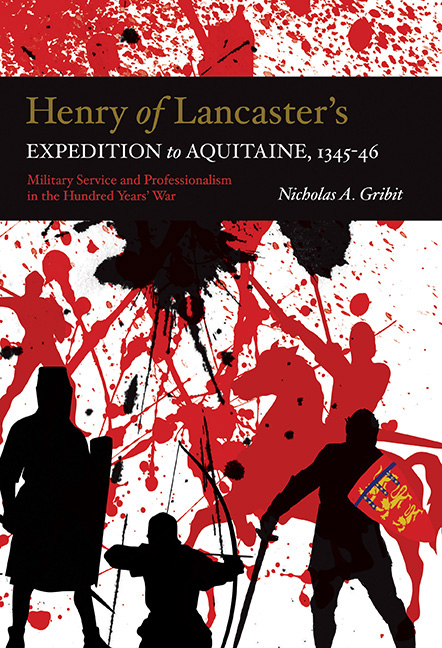 Henry of Lancaster's Expedition to Aquitaine, 1345-1346
Henry of Lancaster's Expedition to Aquitaine, 1345-1346 from Part I - Henry of Lancaster and the English Army: Soldiers, Payment and Recruitment
Published online by Cambridge University Press: 05 July 2016
Historical Background
The military expedition led by Henry of Lancaster to Aquitaine in 1345 was part of a long-running conflict between England and France which is known by historical tradition as The Hundred Years' War (1337–1453). This intermittent and protracted war dominated politics and society in western Europe in the later Middle Ages, and enveloped a swathe of kingdoms which played an integral role in the course of events that ensued. The Iberian kingdoms of Aragon, Castile, Navarre and Portugal, the counties and duchies of Artois, Brabant, Hainault, Holland, Jülich, Luxemburg, Namur and Zeeland that constituted the Low Countries, as well as the Holy Roman Empire, Scotland and the states that form modern-day Italy, were, along with other kingdoms, drawn into the apparently interminable conflict. A plethora of alliances were made between these ruling powers and between them and the two protagonists of the war, the longest lasting of which was the union between France and Scotland which threatened England, on and off, from the ‘Auld Alliance’ in 1295 until a Scottish king, James VI, also became king of England in 1603. In fact the term, Hundred Years' War, or Guerre de cent ans, its French precedent, is a misnomer of nineteenth-century historians that obscures the context of a wider Anglo- French conflict which had begun in the reign of Henry II (1154–89), the first Plantagenet king of England. At the heart of hostilities were English-held territories in France, and the duchy of Aquitaine in particular, which came into English possession through Henry's marriage to Eleanor, the heiress to the duchy, and had remained in the hands of his royal successors since the mid-twelfth century. Other territories that formed part of the Angevin empire – the assemblage of lands under Plantagenet control – at its greatest extent included Normandy, Maine, Anjou, Touraine and Poitou, but by 1204 only Aquitaine remained in English possession. In the successive reigns of Richard I and John hostilities between the kingdoms of England and France persisted, but in the reign of Henry III (1216–72) the relationship between the two monarchs was redefined at the Peace of Paris of 1259. English kings held Aquitaine thereafter as a fief of the French crown.
To save this book to your Kindle, first ensure [email protected] is added to your Approved Personal Document E-mail List under your Personal Document Settings on the Manage Your Content and Devices page of your Amazon account. Then enter the ‘name’ part of your Kindle email address below. Find out more about saving to your Kindle.
Note you can select to save to either the @free.kindle.com or @kindle.com variations. ‘@free.kindle.com’ emails are free but can only be saved to your device when it is connected to wi-fi. ‘@kindle.com’ emails can be delivered even when you are not connected to wi-fi, but note that service fees apply.
Find out more about the Kindle Personal Document Service.
To save content items to your account, please confirm that you agree to abide by our usage policies. If this is the first time you use this feature, you will be asked to authorise Cambridge Core to connect with your account. Find out more about saving content to Dropbox.
To save content items to your account, please confirm that you agree to abide by our usage policies. If this is the first time you use this feature, you will be asked to authorise Cambridge Core to connect with your account. Find out more about saving content to Google Drive.